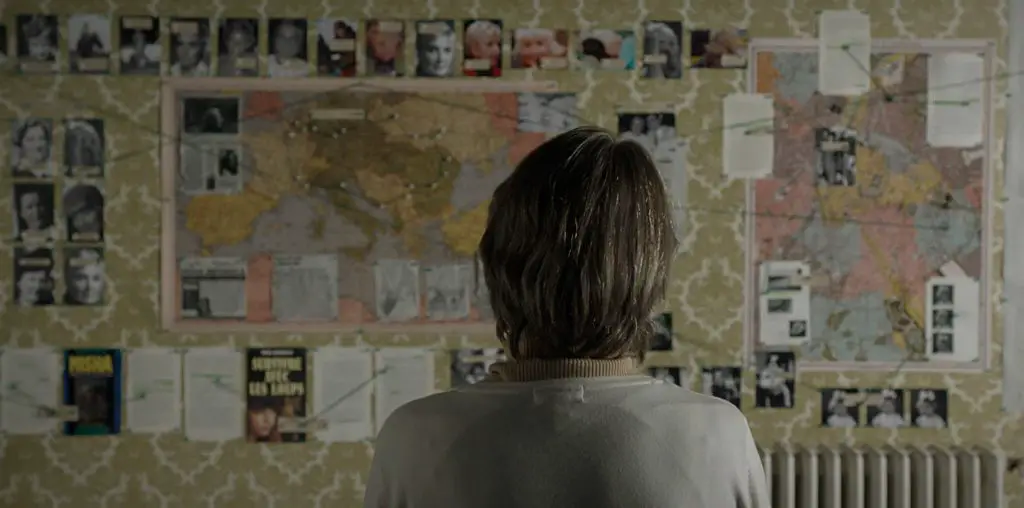
At the end of the Civil War, the only Confederate officer to be tried and executed for war crimes was Capt. Henry Wirz, the Swiss-born commandant of the POW camp at Andersonville, Georgia. Conditions at Andersonville were extraordinary for their deprivation and squalor, with thousands of Union prisoners dead from starvation and disease. Those who survived were literally skin and bones, and photographs taken of the Andersonville survivors are horrifying to examine (even in this jaded age).
In 1959, a court martial drama by Saul Levitt called “The Andersonville Trial” was performed on Broadway. Based on the transcripts of the tribunal action taken against Capt. Wirz, it offered profound questions regarding how military officers can carry out orders which they know are morally reprehensible and which can lead to tragedy. The production starred George C. Scott, who in 1970 directed a filmed version for PBS, which is now being made available on DVD.
It is a shame that Scott stayed behind the camera, for the filmed version needs an actor of his power and personality. Strangely, he cast the film with actors who were not in the league to competently bring out the fury of Levitt’s pointed and often harrowing dialogue. The prosecution of Capt. Wirz is conducted by a paunchy William Shatner, who tries very hard to ring out a commanding performance but who eventually comes across as Capt. Kirk beamed down into a community theater playhouse. Capt. Wirz’s defense is handled by Jack Cassidy, who seemed to study for his part by keeping a mental inventory of Snidely Whiplash’s performances in the old Dudley Doright cartoons. Cassidy is such a sawdust melodrama ham that he does everything but twirl his mustache. As the accused commandant, the normally reliant Richard Basehart saddles himself with a Swiss-German accent that is so bogus that it is impossible to conceive how Scott allowed him to get away with this on camera. He sounds like Benny Hill doing a Teutonic sketch and all Basehart is missing is a little bald man to slap on the head.
Other diversions include Cameron Mitchell snoring his way through the film as the tribunal’s head justice, Gen. Lew Wallace (in real life, he would later write “Ben Hur”). Buddy Ebsen turns up as a country doctor called to testify against the accused, yet he appears to be stuck in character as Jed Clampett. And speaking of sitcoms: if you look closely, you can see Alan Hale Jr. as one of the military judges. He has no dialogue and his faraway _expression can lead one to imagine he is pining for his glory days with Ginger and Mary Ann.
Yet in spite of the wrong casting, “The Andersonville Trial” resonates in its consideration of separating moral responsibility from duty to obey orders. The prosecution of Capt. Wirz rests on the notion that it was his moral right to disobey the Confederacy hierarchy in order to accommodate the physical and medical needs of his prisoners. Throughout the trial, Capt. Wirz and his defense attorney keep pointing out that no military officer on either side of the conflict could seriously be expected to violate orders dealt down from superiors (they also mention, perhaps too briefly, that the Union operated POW camps in the North that treated Confederate prisoners with equal and sometimes greater cruelty–but no one was ever prosecuted for that).
But can military personnel, either a high ranking officer or a lowly recruit, be expected to disobey orders even when those orders are designed to inflict horrors on innocent people? That question has haunted military tribunals from the end of the Civil War through the prosecution of German and Japanese officers at the end of World War II and into the controversial handling of those behind the My Lai massacre (which was ongoing at the time “The Andersonville Trial” first aired). The debate will certainly continue when or if an independent judiciary is set up in Iraq to prosecute Baathist officials or when the day arrives that the so-called enemy combatants in U.S. military custody get to see a court.
If one can overlook the wobbly acting, “The Andersonville Trial” offers profound ideas. Perhaps its debut on DVD will encourage a more focused and solid production to pick up where this well-intended offering failed to succeed.

